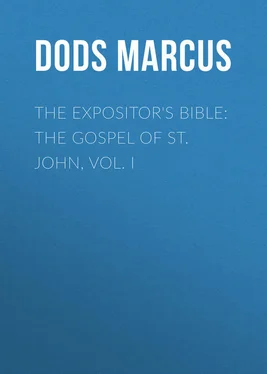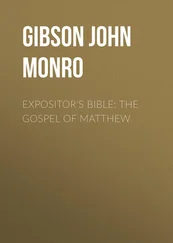Marcus Dods - The Expositor's Bible - The Gospel of St. John, Vol. I
Здесь есть возможность читать онлайн «Marcus Dods - The Expositor's Bible - The Gospel of St. John, Vol. I» — ознакомительный отрывок электронной книги совершенно бесплатно, а после прочтения отрывка купить полную версию. В некоторых случаях можно слушать аудио, скачать через торрент в формате fb2 и присутствует краткое содержание. Издательство: Иностранный паблик, Жанр: foreign_religion, foreign_antique, foreign_prose, на английском языке. Описание произведения, (предисловие) а так же отзывы посетителей доступны на портале библиотеки ЛибКат.
- Название:The Expositor's Bible: The Gospel of St. John, Vol. I
- Автор:
- Издательство:Иностранный паблик
- Жанр:
- Год:неизвестен
- ISBN:нет данных
- Рейтинг книги:4 / 5. Голосов: 1
-
Избранное:Добавить в избранное
- Отзывы:
-
Ваша оценка:
- 80
- 1
- 2
- 3
- 4
- 5
The Expositor's Bible: The Gospel of St. John, Vol. I: краткое содержание, описание и аннотация
Предлагаем к чтению аннотацию, описание, краткое содержание или предисловие (зависит от того, что написал сам автор книги «The Expositor's Bible: The Gospel of St. John, Vol. I»). Если вы не нашли необходимую информацию о книге — напишите в комментариях, мы постараемся отыскать её.
The Expositor's Bible: The Gospel of St. John, Vol. I — читать онлайн ознакомительный отрывок
Ниже представлен текст книги, разбитый по страницам. Система сохранения места последней прочитанной страницы, позволяет с удобством читать онлайн бесплатно книгу «The Expositor's Bible: The Gospel of St. John, Vol. I», без необходимости каждый раз заново искать на чём Вы остановились. Поставьте закладку, и сможете в любой момент перейти на страницу, на которой закончили чтение.
Интервал:
Закладка:
Similarly, the Word of God is God’s power, intelligence, and will in expression; not dormant and potential only, but in active exercise. God’s Word is His will going forth with creative energy, and communicating life from God, the Source of life and being. “Without Him was not any thing made that was made.” He was prior to all created things and Himself with God, and God. He is God coming into relation with other things, revealing Himself, manifesting Himself, communicating Himself. The world is not itself God; things created are not God, but the intelligence and will that brought them into being, and which now sustain and regulate them, these are God. And between the works we see and the God who is past finding out, there is the Word, One who from eternity has been with God, the medium of the first utterance of God’s mind and the first forthputting of His power; as close to the inmost nature of God, and as truly uttering that nature, as our word is close to and utters our thought, capable of being used by no one besides, but by ourselves only .
It is apparent, then, why John chooses this title to designate Christ in His pre-existent life. No other title brings out so clearly the identification of Christ with God, and the function of Christ to reveal God. It was a term which made the transition easy from Jewish Monotheism to Christian Trinitarianism. Being already used by the strictest Monotheists to denote a spiritual intermediary between God and the world, it is chosen by John as the appropriate title of Him through whom all revelation of God in the past has been mediated, and who has at length finished revelation in the person of Jesus Christ. The term itself does not explicitly affirm personality; but what it helps us to understand is, that this same Being, the Word, who manifested and uttered God in creation, reveals Him now in humanity. John wishes to bring the incarnation and the new spiritual world it produced into line with the creation and God’s original purpose therein. He wishes to show us that this greatest manifestation of God is not an abrupt departure from previous methods, but is the culminating expression of methods and principles which have ever governed the activity of God. Jesus Christ, who reveals the Father now in human nature, is the same Agent as has ever been expressing and giving effect to the Father’s will in the creation and government of all things. The same Word who now utters God in and through human nature, has ever been uttering Him in all His works.
All that God has done is to be found in the universe, partly visible and partly known to us. There God may be found, because there He has uttered Himself. But science tells us that in this universe there has been a gradual development from lower to higher, from imperfect towards perfect worlds; and it tells us that man is the last result of this process. In man the creature at last becomes intelligent, self-conscious, endowed with will, capable to some extent of meeting and understanding its Creator. Man is the last and fullest expression of God’s thought, for in man and man’s history God finds room for the utterance not merely of His wisdom and power, but of what is most profoundly spiritual and moral in His nature. In man God finds a creature who can sympathise with His purposes, who can respond to His love, who can give exercise to the whole fulness of God.
But in saying that “the Word become flesh” John says much more than that God through the Word created man, and found thus a more perfect means of revealing Himself. The Word created the visible world, but He did not become the visible world. The Word created all men, but He did not become the human race, but one Man, Christ Jesus. No doubt it is true that all men in their measure reveal God, and it is conceivable that some individual should fully illustrate all that God meant to reveal by human nature. It is conceivable that God should so sway a man’s will and purify his character that the human will should be from first to last in perfect harmony with the Divine, and that the human character should exhibit the character of God. An ideal man might have been created, God’s ideal of man might have been realized, and still we should have had no incarnation. For a perfect man is not all we have in Christ. A perfect man is one thing, the Word Incarnate is another. In the one the personality, the “I” that uses the human nature, is human; in the other, the personality, the “I,” is Divine.
By becoming flesh the Word submitted to certain limitations, perhaps impossible for us to define. While in the flesh He could reveal only what human nature was competent to reveal. But as the human nature had been created in the likeness of the Divine, and as, therefore, “good” and “evil” meant the same to man as to God, the limitation would not be felt in the region of character.
The process of the Incarnation John describes very simply: “The Word became flesh, and dwelt among us.” The Word did not become flesh in the sense that He was turned into flesh, ceasing to be what He had previously been, as a boy who becomes a man ceases to be a boy. In addition to what He already was He assumed human nature, at once enlarging His experience and limiting His present manifestations of Divinity to what was congruous to human nature and earthly circumstance. The Jews were familiar with the idea of God “dwelling” with His people. At the birth of their nation, while they were still dwelling in tents outside the land of promise, God had His tent among the shifting tents of the people, sharing all the vicissitudes of their wandering life, abiding with them even in their thirty-eight years’ exclusion from their land, and thus sharing even their punishment. By the word John here uses he links the body of Christ to the ancient dwelling of God round which the tents of Israel had clustered. God now dwelt among men in the humanity of Jesus Christ. The tabernacle was human, the indwelling Person was Divine. In Christ is realized the actual presence of God among His people, the actual entrance into and personal participation in human history, which was hinted at in the tabernacle and the temple.
In the Incarnation, then, we have God’s response to man’s craving to find, to see, to know Him. Men, indeed, commonly look past Christ and away from Him, as if in Him God could not be satisfactorily seen; they discontentedly long for some other revelation of the unseen Spirit. But surely this is to mistake. To suppose that God might make Himself more obvious, more distinctly apparent to us, than He has done, is to mistake what God is and how we can know Him. What are the highest attributes of Divinity, the most Divine characteristics of God? Are they great power, vast size, dazzling physical glory that overpowers the sense; or are they infinite goodness, holiness that cannot be tempted, love that accommodates itself to all the needs of all creatures? Surely the latter, the spiritual and moral qualities, are the more Divine. The resistless might of natural forces shows us little of God till we have elsewhere learned to know Him; the power that upholds the planets in their orbits speaks but of physical force, and tells us nothing of any holy, loving Being. There is no moral quality, no character, impressed upon these works of God, mighty though they be. Nothing but an impersonal power meets us in them; a power which may awe and crush us, but which we cannot adore, worship, and love. In a word, God cannot reveal Himself to us by any overwhelming display of His nearness or His power. Though the whole universe fell in ruins around us, or though we saw a new world spring into being before our eyes, we might still suppose that the power by which this was effected was impersonal, and could hold no fellowship with us.
Only, then, through what is personal, only through what is like ourselves, only through what is moral, can God reveal Himself to us. Not by marvellous displays of power that suddenly awe us, but by goodness that the human conscience can apprehend and gradually admire, does God reveal Himself to us. If we doubt God’s existence, if we doubt whether there is a Spirit of goodness upholding all things, wielding all things, and triumphant in all things, let us look to Christ. It is in Him we distinctly see upon our own earth, and in circumstances we can examine and understand, goodness ; goodness tried by every test conceivable, goodness carried to its highest pitch, goodness triumphant. This goodness, though in human forms and circumstances, is yet the goodness of One who comes among men from a higher sphere, teaching, forgiving, commanding, assuring, saving, as One sent to deal with men rather than springing from them. If this is not God, what is God? What higher conception of God has any one ever had? What worthy conception of God is there that is not satisfied here? What do we need in God, or suppose to be in God, which we have not in Christ?
Читать дальшеИнтервал:
Закладка:
Похожие книги на «The Expositor's Bible: The Gospel of St. John, Vol. I»
Представляем Вашему вниманию похожие книги на «The Expositor's Bible: The Gospel of St. John, Vol. I» списком для выбора. Мы отобрали схожую по названию и смыслу литературу в надежде предоставить читателям больше вариантов отыскать новые, интересные, ещё непрочитанные произведения.
Обсуждение, отзывы о книге «The Expositor's Bible: The Gospel of St. John, Vol. I» и просто собственные мнения читателей. Оставьте ваши комментарии, напишите, что Вы думаете о произведении, его смысле или главных героях. Укажите что конкретно понравилось, а что нет, и почему Вы так считаете.












